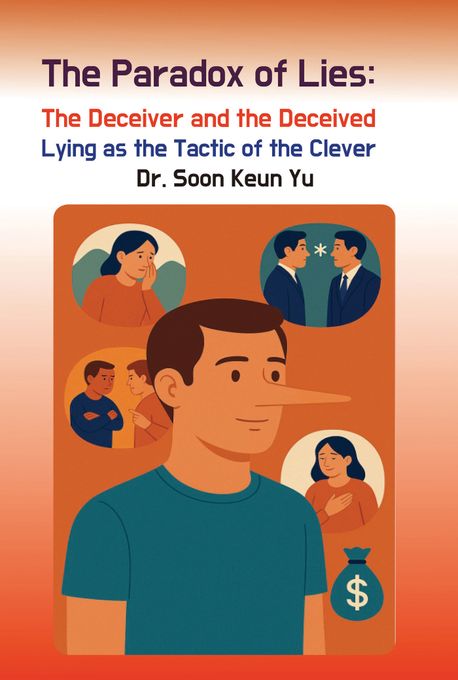The Paradox of Lies: The Deceiver and the Deceived
2025년 08월 08일 출간
- eBook 상품 정보
- 파일 정보 PDF (20.60MB)
- ISBN 9791139038262
- 쪽수 292쪽
- 지원기기 교보eBook App, PC e서재, 리더기, 웹뷰어
-
교보eBook App
듣기(TTS) 가능
TTS 란?텍스트를 음성으로 읽어주는 기술입니다.
- 전자책의 편집 상태에 따라 본문의 흐름과 다르게 텍스트를 읽을 수 있습니다.
- 이미지 형태로 제작된 전자책 (예 : ZIP 파일)은 TTS 기능을 지원하지 않습니다.
PDF 필기가능 (Android, iOS)

이 상품은 배송되지 않는 디지털 상품이며,
교보eBook앱이나 웹뷰어에서 바로 이용가능합니다.
작품소개
이 상품이 속한 분야
Lying is not merely the act of concealing or distorting facts. It is a complex and strategic behavior that arises at the intersection of human emotions, desires, fears, social structures, morality, cognitive ability, and survival instincts. People lie to avoid conflict, protect their reputation, shield others, or elevate themselves. Sociologist Erving Goffman described lying not as a moral failing, but as a social skill. The very existence of the phrase “a white lie” reflects how flexible moral judgment around deception can be. In this light, lying is far too common—and at times too necessary—to be dismissed simply as a vice.
Sometimes, lying is not only seen as a clever tactic for the shrewd, but also as a contagious social phenomenon. Yet, this does not mean lying should be justified. Lies inevitably damage trust, fracture relationships, and threaten the ethical foundations of any community. Still, lying is deeply rooted in human nature—and it becomes more pervasive in times of uncertainty or crisis. Lying is not merely a tool of the cunning but also a deceitful act of the morally corrupt.
The Paradox of Lying: The Deceiver and the Deceived is a comprehensive examination of deception strategies and the methods used to detect them. Part I begins by asking a fundamental question: Why do humans lie? By analyzing the psychological motivations, social causes, and factors contributing to both successful and failed lies, this section dissects the mechanisms underlying deception. Drawing on a wide range of scholarly studies, it explores the definition and components of lying and categorizes the behavioral patterns and psychological traits of liars. Through this, we come to understand that lying is not merely a personal flaw, but a product of broader social and psychological conditions.
Part II shifts focus to lie detection. Why do people lie, and how are they caught? Using Paul Ekman’s theory of emotion, the Pinocchio effect, and key emotional elements of deception—fear, guilt, shame, and pleasure—this section explores how lies generate emotional tension that leaves behind physical and verbal traces. Because deception carries the inherent risk of exposure, it inevitably produces physiological, emotional, and behavioral indicators.
This book pays particular attention to nonverbal cues—body language, facial expressions, eye movements, gestures of the shoulders, hands, legs, and feet—as critical signs of concealed deception. These are often involuntary and can reveal lies even before the words are spoken. However, this book does more than merely teach how to “catch a liar.” It seeks to deepen our understanding of human nature by exploring the psychological and social backgrounds in which lies are born.
Is lying the clever tactic of the shrewd—or a manifestation of human selfishness and moral decay? Lying is certainly a dark shadow of human behavior. It is something we wish to hide, yet it always lingers within us and sometimes functions as a necessary evil. This book confronts that shadow directly and asks: Are we truly telling the truth? And whose lies are we currently believing? These questions lead us into an exploration of the very foundations of human nature, truth, and trust.
The Paradox of Lying: The Deceiver and the Deceived combines behavio
01. Why Do Humans Lie? 13
02. Why We Fall for Lies 20
03. Why Lying Is Harmful 25
04. Characteristics of a Liar 31
05. Characteristics of Deceptive Behavior 37
06. Scholarly Perspectives on Lying 45
07. Constituent Elements of a Lie 61
08. Types of Lies 67
09. Types of Motivations for Lying 72
10. Psychological Motivation for Lying 77
11. Types of Successful Lies 81
12. Reasons Why Lies Fail 88
Part II: Lie Detection 95
13. Emotions in Deception 97
14. Emotional Elements of Deception 101
15. Fear of Detection in Deception 104
16. Guilt in Deception 108
17. Shame in Deception 114
18. The Pleasure of Deception 120
19. Reasons for Behavioral Leakage 126
20.Deception 134
21. Characteristics of Deceivers 141
22. Deception Strategies 146
23. Behavioral Traits of Deceivers 151
24. Typical Reactions of Deceivers 156
25. Principles of Deception Detection 162
26. Cues for Detecting Deception 168
27. Verbal Cues 173
28. Paralinguistic Cues 180
29. Physical Cues 188
30. Facial Cues 194
31. Basic Emotions 200
32. Body Movement Cues 204
33. Head Cues 211
34. Shoulder Cues 216
35. Facial Expression Cues 220
36. Eye Movement Cues 226
37. Eye Contact Cues 230
38. Tear Cues 235
39. Eye Blinking Cues 241
40. Nose Cues 246
41. Mouth and Tongue Cues 251
42. Chin Cues 255
43. Arm Cues 259
44. Hand Cues 264
45. Leg Cues 271
46. Foot Cues 278
References 284
Index 287
Sometimes, lying is not only seen as a clever tactic for the shrewd, but also as a contagious social phenomenon. Yet, this does not mean lying should be justified. Lies inevitably damage trust, fracture relationships, and threaten the ethical foundations of any community. Still, lying is deeply rooted in human nature—and it becomes more pervasive in times of uncertainty or crisis. Lying is not merely a tool of the cunning but also a deceitful act of the morally corrupt.
The Paradox of Lying: The Deceiver and the Deceived is a comprehensive examination of deception strategies and the methods used to detect them. Part I begins by asking a fundamental question: Why do humans lie? By analyzing the psychological motivations, social causes, and factors contributing to both successful and failed lies, this section dissects the mechanisms underlying deception. Drawing on a wide range of scholarly studies, it explores the definition and components of lying and categorizes the behavioral patterns and psychological traits of liars. Through this, we come to understand that lying is not merely a personal flaw, but a product of broader social and psychological conditions.
작가정보
저자(글) 유순근 (Soon Keun Yu)
Soon Keun Yu (舜根柳: PhD in Business Administration)
∙ Former Professor at Hallym University
∙ Graduated from Korea University (Business)
∙ Soongsil University Graduate School (PhD in Business
Administration)
∙ Received the Minister of Justice Award (Korea)
[Major works]
∙ The Art of Timing: The Second Part of the I Ching (Amazon)
∙ The Art of Timing: The First Part of the I Ching (Amazon)
∙ A Bird that Flies Far Sees Far: The Wisdom of the I Ching (Amazon)
∙ The Paradox of Lies: The Deceiver and the Deceived (Amazon)
∙ The I Ching that Predicts Destiny (Amazon)
∙ The Book of Changes: Commentary Part 1 (Parkmunsa)
∙ The Book of Changes: Commentary Part 2 (Parkmunsa)
∙ The Analects of Confucius Part 1 (Parkmunsa)
∙ The Analects of Confucius Part 2 (Parkmunsa)
∙ Essay and Thesis Writing (Parkyoungsa)
∙ Even in Hell, Devils Don't Lie to Each Other (Parkmunsa)
∙ Logic and Fallacies, 3rd Edition (Parkyoungsa)
∙ Vertical Rise of Wealth: Asking for the Way to Ideas (Parkmunsa)
∙ Theory and Practice of Behavioral Change (Parkmunsa)
∙ Thesis Statistical Analysis: Analysis and Interpretation of SPSS and AMOS
(Co- authored by Yoo Jeong-je, Jinsam Media)
∙ Venture Start-Up and Management, 4th Edition (Parkyoungsa)
∙ New Product Development Theory (Parkyoungsa)
∙ Strategic Management for Global Leaders (Parkyoungsa)
∙ Sense Management (Jinsam Media)
∙ Entrepreneurship On/Off Marketing (Parkyoungsa)
∙ Service Marketing (Trade Management Publishing)
∙ Sense Marketing (Trade Management Publishing)
∙ Business Communication (Trade Management Publishing)
이 상품의 총서
Klover리뷰 (0)
- - e교환권은 적립일로부터 180일 동안 사용 가능합니다.
- - 리워드는 5,000원 이상 eBook, 오디오북, 동영상에 한해 다운로드 완료 후 리뷰 작성 시 익일 제공됩니다. (2024년 9월 30일부터 적용)
- - 리워드는 한 상품에 최초 1회만 제공됩니다.
- - sam 이용권 구매 상품 / 선물받은 eBook은 리워드 대상에서 제외됩니다.
- 도서나 타인에 대해 근거 없이 비방을 하거나 타인의 명예를 훼손할 수 있는 리뷰
- 도서와 무관한 내용의 리뷰
- 인신공격이나 욕설, 비속어, 혐오 발언이 개재된 리뷰
- 의성어나 의태어 등 내용의 의미가 없는 리뷰
구매 후 리뷰 작성 시, e교환권 100원 적립
문장수집
- 구매 후 90일 이내에 문장 수집 등록 시 e교환권 100원을 적립해 드립니다.
- e교환권은 적립일로부터 180일 동안 사용 가능합니다.
- 리워드는 5,000원 이상 eBook에 한해 다운로드 완료 후 문장수집 등록 시 제공됩니다. (2024년 9월 30일부터 적용)
- 리워드는 한 상품에 최초 1회만 제공됩니다.
- sam 이용권 구매 상품 / 선물받은 eBook / 오디오북·동영상 상품/주문취소/환불 시 리워드 대상에서 제외됩니다.
구매 후 문장수집 작성 시, e교환권 100원 적립
신규가입 혜택 지급이 완료 되었습니다.
바로 사용 가능한 교보e캐시 1,000원 (유효기간 7일)
지금 바로 교보eBook의 다양한 콘텐츠를 이용해 보세요!








